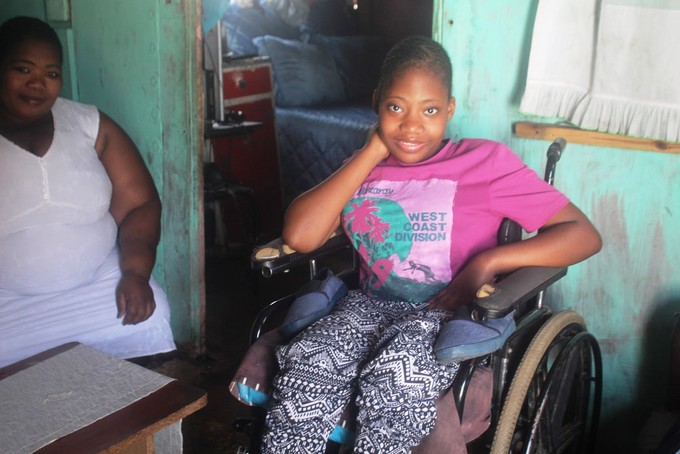Paralysed teenager bitten by rats while sleeping
14-year-old Palesa Kwayiba, who uses a wheelchair, puts a brave face on the daily struggle of living in an informal settlement
Palesa has no feeling in her lower body and has lost the use of her legs. She was born healthy and able-bodied, but at three weeks she fell ill and was placed in Red Cross Children’s Hospital. She was then diagnosed with a spinal defect.
Her mother, Zandile Kwayiba, says she has been doing everything in her power to provide for her daughter and her two younger children, but she struggles to work as she needs to nurse Palesa. She depends on social grants.
Palesa’s wheelchair, borrowed from the Tembalethu Special School in Gugulethu which she attends, has seen better days. The rubber on the wheels is perished, the foam stuffing emerges from bust seams, and the backrest is broken.
Tembalethu provides a taxi for children with special needs. Kwayiba pays R250 a month for the transport service, but the taxi does not go into Barcelona informal settlement where the family has been living for 13 years.
Another wheelchair was donated to the family during the election campaign earlier this year, but Palesa could not use it because it was far too big for her. Her arms couldn’t even reach the wheels and it had no proper back support for her spine.
There are no toilets near the family’s shack and they have to use their neighbour’s toilet.
Support independent journalism
Donate using Payfast

Don't miss out on the latest news
We respect your privacy, and promise we won't spam you.
Next: Teachers attacked at Khayelitsha primary school
Previous: Civil society leader shot in the mouth with a rubber bullet at campus meeting
Letters
Dear Editor
Compliments to the GroundUp team for much of your work, however, this is now the second article in recent weeks where you've used disablist/ableist language (seemingly unwittingly) in a headline or standfirst. Is this the "high-quality, ethical journalism" you value?
Can you explain why you use the phrase "wheelchair-bound" to describe a person who uses a wheelchair. Is Palesa bound to her wheelchair?
Additionally, in Thembela Ntongana's article from 14 October 2016, who do you mean by"the disabled"? Would you say "the blacks" to describe black people?
For all your good intentions in publishing such pieces, what are the knock-on effects of continuing to use misleading (and offensive to many people) language?
Should you be interested, one of many overviews on such language choices can be read here:
http://www.anti-bullyingalliance.org.uk/media/20386/Ato-Z-of-Offensive-language-FINAL.pdf
© 2016 GroundUp. 
This article is licensed under a Creative Commons Attribution-NoDerivatives 4.0 International License.
You may republish this article, so long as you credit the authors and GroundUp, and do not change the text. Please include a link back to the original article.

